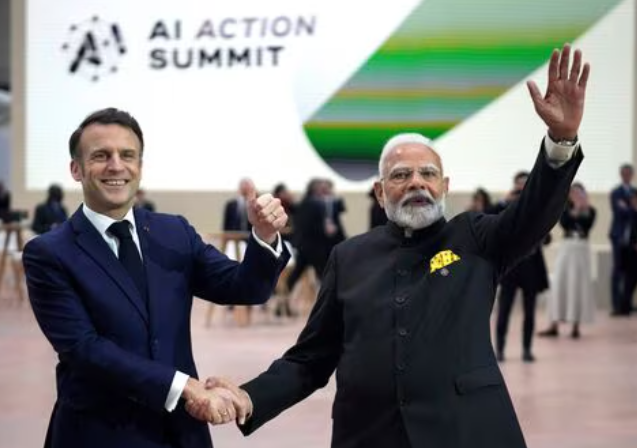AI: For Good and for all
Syllabus:
GS 3: Emerging technologies
Why in the News?
India co-chaired the Paris AI Action Summit alongside French President Emmanuel Macron, highlighting the need for inclusive AI governance, ethical deployment, and bridging the AI divide between the Global North and South.
Introduction
- Artificial Intelligence (AI) is rapidly transforming economies, governance, and societies.
- While its potential is vast, concerns about bias, accessibility, and ethical governance
- Ensuring AI benefits all, especially the Global South, requires collaborative efforts.
- India, with its digital infrastructure and inclusive policies, can play a pivotal role in shaping responsible AI development.
Power and Challenges of AI
- Artificial Intelligence (AI) is changing the world rapidly.
- It is being used in healthcare, education, security, governance, and many other fields.
- However, AI also has challenges. One major issue is bias in training data.
- For example, an AI app can accurately analyze a medical report and explain it in simple words.
- But if the same app is asked to draw an image of a person writing with their left hand, it will likely show a person writing with their right hand.
- This happens because the training data mostly includes right-handed individuals.
- Such biases show that while AI has great potential, it must be developed carefully.
- India, as a global leader in technology, has a big role to play in making AI fair, ethical, and accessible to all.
AI’s Rapid Growth and the Need for Global Governance
- AI is developing faster than any previous technology.
- New AI systems are being created every day, and people across the world are using them.
- However, because AI is deeply connected across borders, it cannot be regulated by one country alone.
- There is an urgent need for international cooperation to set rules that ensure AI is safe, fair, and trustworthy.
- AI governance is not just about controlling risks.
- It should also encourage innovation and ensure AI benefits everyone, especially developing nations.
- The AI Action Summit in Paris provides a great opportunity for countries, including India, to discuss these important issues.
Ensuring AI Access for the Global South
- Many countries in the Global South lack resources such as computing power, data, and financial support.
- This makes it difficult for them to develop and use AI.
- Without proper support, the AI revolution will only benefit developed nations, widening the gap between the Global North and the Global South.
- To bridge this gap, AI governance must focus on making AI accessible to all.
- Countries need to work together to provide affordable AI tools, open-source platforms, and training opportunities.
- India can lead this effort by sharing its expertise in digital infrastructure and inclusive technology.
AI’s Role in Solving Global Challenges
- AI has the power to improve millions of lives. It can help solve many problems in different sectors, including:
Healthcare
- AI can help doctors diagnose diseases faster and more accurately.
- It can predict outbreaks of diseases and suggest preventive measures.
Education
- AI can personalize learning for students based on their needs.
- It can provide education to children in remote areas through online platforms.
Agriculture
- AI can help farmers predict weather conditions and improve crop yield.
- It can detect pests and suggest the best farming practices.
Sustainable Development
- AI can optimize energy use and support climate change solutions.
- It can improve disaster management by predicting floods, earthquakes, and other natural calamities.
- By using AI for social good, countries can achieve their Sustainable Development Goals (SDGs) faster.
Addressing Key AI Concerns
- While AI has many benefits, it also comes with risks.
- Some of the major concerns include:
Job Loss and Workforce Disruption
- Many people fear that AI will replace human jobs. However, history shows that technology does not eliminate work but changes its nature.
- New jobs will be created in AI-driven industries, and people must be trained to adapt to these changes.
- Investing in skill development and re-skilling programs is essential to prepare the workforce for an AI-driven future.
Cybersecurity and Misinformation
- AI can be misused for cyberattacks, deepfakes, and spreading false information.
- Strong regulations and monitoring systems are needed to prevent these threats.
Energy Consumption and Sustainability
- AI systems require a lot of computing power, leading to high energy consumption.
- To make AI sustainable, it must be powered by green energy sources.
India’s AI Leadership and Contributions
- India has made significant progress in AI development. Some key achievements include:
Digital Public Infrastructure
- India has built a large-scale digital infrastructure that serves 1.4 billion people.
- This system is open, accessible, and supports various applications in governance and business.
AI for Public Good
- India is using AI to improve healthcare, agriculture, and education.
- AI-driven solutions are being developed to assist small businesses and rural communities.
Data Empowerment and Protection
- India has introduced strong data protection laws to ensure privacy and security.
- The country has developed a unique public-private partnership model for AI, allowing startups and researchers to access computing power at an affordable cost.
India’s Role in Global AI Governance
- During its G20 presidency, India helped build a consensus on responsible AI usage.
- India is now working on its own Large Language Model that considers the country’s linguistic and cultural diversity.
- By sharing its knowledge and experience, India aims to make AI development more inclusive and ethical worldwide.
Conclusion
AI is a powerful tool that must be developed responsibly. With ethical governance, inclusivity, and sustainability, AI can drive global progress while ensuring benefits for all, especially developing nations.
Source: Indian Express
Mains Practice Question:
Discuss the role of Artificial Intelligence (AI) in reshaping global governance. How can India ensure equitable access to AI resources for the Global South?




